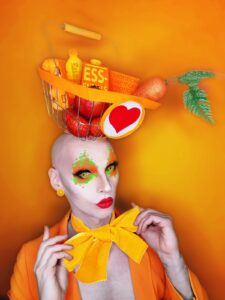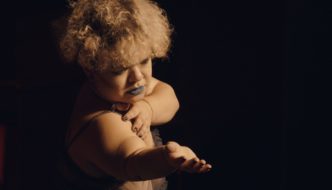Lockdown hit every industry hard, but especially the arts. When it happened, artists had to operate in an arena of uncertainty constantly. Manchester is a city known for its artistic flair and vibrancy; art pours from every corner of this city and takes on many different forms. Whether that is street art plastered on the walls of the Northern Quarter, to carefully arranged stickers on a cubicle door of a pub, artists in this city work with a purpose.
Earlier this year, when it all came to a halt, many believed the fate for this to continue was futile.
Manchester International Festival (MIF) saw these unprecedented times as a driving force for opportunity. Usually within the arts industry, a network is formed through in-person work with each other. Unlike other industries, such networks aren’t readily available; work comes in a cycle, appearing and dissipating, leaving no sense of normality for those in this industry.
MIF wanted to change this narrative. They created weekly virtual drop-in events for artists in which they could interact and relate to people in similar positions to them. These MIF events, still happening now, encourage creative collaboration. They have drawn in great audiences every week, creating something that has value beyond the coronavirus crisis, and instead, made a localised network here to stay.
On August 20th, MIF collaborated with theatre-maker Simone French and drag-legend Cheddar Gorgeous to create a drop-in event, ‘Matchmakers’, that was inspired by old-school video dating. “Almost like modern day speed-dating,” Cheddar laughs. “Artists could come on and talk about the practise they are looking for. It was a great way to engender these modern artists. And it’s worked! We are doing it monthly now.”

When lockdown first happened, Cheddar was one of the recipients of the Residency and Isolation Fee fund. Cheddar knew that other artists weren’t as fortunate to receive this kind of support. “It is an extraordinary and wonderful thing to see an organisation such as MIF do something like this. So often big organisations are criticised for not helping. In MIF’s case, they didn’t necessarily need to, yet they threw themselves into helping people.”
Cheddar already had a relationship with MIF, having previously worked with them as a guest speaker at some of their events. “A lot of the work I do is in the commercial sector,” Cheddar explained. “I had been so accustomed to this kind of work and the gigs that I was doing that I had never felt like I was fully immersed in the arts and culture world.” These virtual drop-ins strengthened the existing relationship with MIF. “Lockdown allowed me to take my art more seriously. Sometimes you lose sight of the fact that your work has value. The MIF changed my perception of my work. Since then, it has given me the confidence to apply for other grants.”
Cheddar affirms that part of the motivation to do this was because of the support of organizations like MIF and argues that other organizations, who have the capacity to help, should similarly do so: “The energy from the top trickles down to the bottom and generates more motivation for people.”
What’s unique about these virtual MIF events is the openness that they provide. A residency with MIF can be about anything. It encourages self-production, meaning artists don’t have to worry about specific pitches or specific works, but have free range to explore their creativity. Cheddar compares the level of support that MIF offered to plants. “They [MIF] planted seed funding and let the seed grow, and it is this kind of thing that keeps people going. I like that idea. Planting things and watching them grow.”
The transfer to the virtual world did however leave Cheddar slightly cynical about the future for post-pandemic drag performance. “Moving online, it is a weird position to be in. There are opportunities to perform but not to pay rent. We have an ever-ready supply for exposure, a platform to perform on, and we are expected to be grateful and thankful. The real truth is that it creates an over-saturation of artistic content.” Cheddar is aware that some of their best online projects wouldn’t have been achievable if not for MIF’s grant. “MIF can’t bear the burden on their own – more organizations need to become involved.” MIF’s consistent funding is helping Manchester’s arts scenes slowly but surely get back to their feet. “We are lucky, Manchester,” Cheddar says, “We have a large art scene here and have had quite a lot of spurs forward.”
Followers of their Instagram know Cheddar is not shy from being politically active. When asked why it was important to use their social media presence as a focal point for politics, Cheddar simply responded: “Because I can.” This wasn’t always met positively, with people ‘politely’ reminding Cheddar to stay in their place, and to remember that they are an entertainer. “I’m not here to entertain you!” Cheddar laughs.
Within our recent political climate, our social media feeds are met with a sometimes overwhelming amount of posts referencing COVID-19, the ever-growing BLM movement and local political debates. Cheddar believes that now more than ever it is important to exercise the power of what a strong social media following can hold. “What is at the core of drag for me is the creation of a living spectacle. The creation of a ball of tension-based energy.”
This can be translated into the spectacle of spurring on positive change. When growing up, Cheddar watched their family, all of whom are in a medical profession, use their power to help people for the better. “I’m a huge superhero geek, and I always think of the phrase: ‘With great power comes great responsibility.’ It’s true – if you have the ability to help someone, you should.”
Cheddar is not alone in experiencing back-lash for using their online presence as a platform for change. Many celebrities are often accused of ‘performative activism’, shortly leading to the internet turning on them, and their reputation becoming ‘cancelled.’ This doesn’t mean that it should deter them. “Self-interest can’t get us through. I don’t believe we are designed that way,” says Cheddar. “If you have something in you that is perceived as ‘different’, you develop empathy. I live in a constant state of awareness, not fear. When I am dressed up, or walking down the street hand in hand with my partner, it only increases that more. So, if you have that empathy but don’t want to use it for something good, I can’t help but wonder: why? It takes nothing to put a post out there.”
If you haven’t already, you must watch Netflix’s film The Social Dilemma to educate yourself about the human impact of social networking. Cheddar discussed it, describing social media as “a grain of sand that irritates humanity.”
“We are in a world full of human created horror, and the systems that go into our world create horror. If you tried to take on all of the horror in this world, you’d go mad.” This doesn’t mean we have an excuse to shy away from it either. “I was glad to see it happening and as a white artist, I learned a huge amount. The riots and marches I believe made a huge difference, but I am still cynical about online activism.”
As seen in The Social Dilemma, social media can cause us to lose sight of what we are doing and what we are actually contributing when we use it, totally oblivious to where the money actually goes. “I say this as a person who is a part of it,” Cheddar remarks. “The content we create to generate change online ends up furthering the wealth of white, male shareholders. We need to have a better understanding of what drives the media, the things that drive clickbait and we must lose the notion that the market balances itself.”
It’s not all doom and gloom, and as the dust settles, there is still a lot to be hopeful about moving forward. “What I am going to embrace about 2020 is it’s disruptive potential. We have the potential to realise this new information, and work with evidence based truth as well as our personal truth. We need to change people’s understanding of how trust works, of how truth works, and how the media and economy actually works.”
When asked if they thought the world was ready for such a feat, Cheddar let out a laugh. “It has to be, darling.”
You can follow Cheddar on Instagram @cheddar_gorgeous
Find out what else the MIF have coming up here.
Filed under: Art & Photography, Theatre & Dance
Tagged with: activism, covid-19, drag, drag queens, manchester drag scene, Manchester International Festival, MIF, social media, the Social Dilemma



Comments